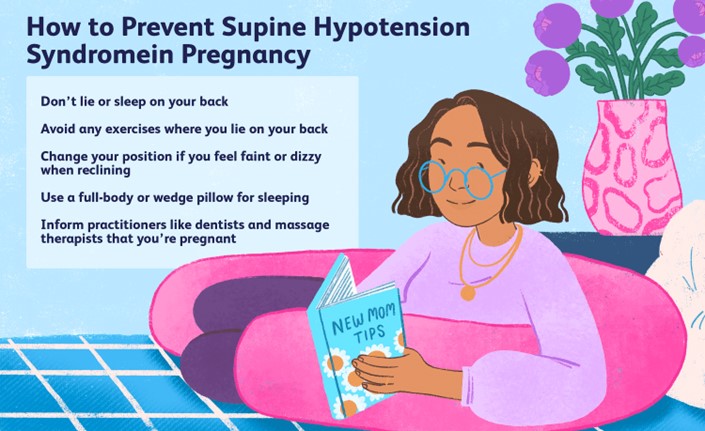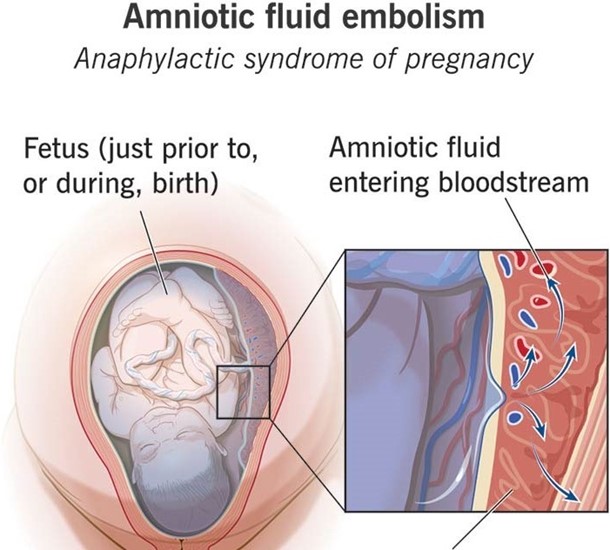In a client's seventh month of pregnancy, she reports feeling "dizzy, like I'm going to pass out, when I lie down flat on my back". The nurse explains that this is due to:
Select one:
Physiologic anemia due to maternal increased plasma volume.
Pressure of the gravid uterus on the maternal inferior vena cava and aorta.
Pressure of the presenting fetal part on the maternal diaphragm.
A 50% increase in maternal blood volume during pregnancy.
The Correct Answer is B
Choice A Reason: Physiologic anemia due to maternal increased plasma volume. This is an incorrect answer that refers to a different condition that affects hemoglobin levels, not blood pressure. Physiologic anemia is a condition where the maternal plasma volume increases more than the red blood cell mass during pregnancy, which dilutes the hemoglobin concentration and lowers the hematocrit value. Physiologic anemia does not cause significant symptoms or complications in pregnant women, as it is an adaptive mechanism that enhances oxygen delivery and prevents fluid overload.
Choice B Reason: Pressure of the gravid uterus on the maternal inferior vena cava and aorta. This is because this statement explains the cause of supine hypotensive syndrome, which is a condition where lying flat on the back causes compression of the major blood vessels by the gravid uterus, which reduces venous return and cardiac output, which lowers blood pressure and perfusion to vital organs. Supine hypotensive syndrome can cause symptoms such as dizziness, lightheadedness, nausea, pallor, or syncope in pregnant women, especially in the third trimester.
Choice C Reason: Pressure of the presenting fetal part on the maternal diaphragm. This is an incorrect answer that indicates a different condition that affects respiratory function, not blood pressure. Pressure of the presenting fetal part on the maternal diaphragm is a result of cephalic engagement or lightening, which occurs when the fetal head descends into the pelvis and occupies more space in the abdominal cavity. Pressure of the presenting fetal part on the maternal diaphragm can cause symptoms such as dyspnea, heartburn, or rib pain in pregnant women.
Choice D Reason: A 50% increase in maternal blood volume during pregnancy. This is an incorrect answer that describes a normal physiological change that occurs during pregnancy, not a cause of supine hypotensive syndrome. A 50% increase in maternal blood volume during pregnancy is due to increased production of plasma and red blood cells, which helps meet the increased oxygen and nutrient demands of the fetus and placenta, and prepares the mother for blood loss during delivery. A 50% increase in maternal blood volume during pregnancy does not cause hypotension or dizziness in pregnant women.

Nursing Test Bank
Naxlex Comprehensive Predictor Exams
Related Questions
Correct Answer is C
Explanation
Choice A Reason: Manifestations of uteroplacental insufficiency. This is an incorrect answer that describes a different condition that affects the fetus, not the mother. Uteroplacental insufficiency is a condition where the placenta fails to deliver adequate oxygen and nutrients to the fetus, which can result in fetal growth restriction, distress, or demise. Uteroplacental insufficiency does not cause shortness of breath, hypoxia, or cyanosis in the mother.
Choice B Reason: Manifestations of prolapsed cord. This is an incorrect answer that refers to another condition that affects the fetus, not the mother. Prolapsed cord is a condition where the umbilical cord slips through the cervix before the baby and becomes compressed by the fetal head, which can reduce oxygen flow to the fetus. Prolapsed cord does not cause shortness of breath, hypoxia, or cyanosis in the mother.
Choice C Reason: Manifestations of anaphylactoid syndrome of pregnancy. This is because anaphylactoid syndrome of pregnancy, also known as amniotic fluid embolism, is a rare and fatal condition where amniotic fluid enters into the maternal bloodstream and causes an allergic reaction, which can lead to respiratory failure, cardiac arrest, coagulopathy, and coma. Anaphylactoid syndrome of pregnancy can occur during or after labor and delivery, especially in cases of NSVD, multiparity, advanced maternal age, or placental abruption.
Choice D Reason: Manifestations of an acute asthmatic episode. This is an incorrect answer that assumes that the mother has a history of asthma or an allergic trigger. Asthma is a chronic inflammatory disorder of the airways that causes wheezing, coughing, chest tightness, and dyspnea. Asthma can be exacerbated by pregnancy or labor, but it is not a common cause of sudden onset respiratory distress in the postpartum period.

Correct Answer is B
Explanation
Choice A Reason: Physiologic anemia due to maternal increased plasma volume. This is an incorrect answer that refers to a different condition that affects hemoglobin levels, not blood pressure. Physiologic anemia is a condition where the maternal plasma volume increases more than the red blood cell mass during pregnancy, which dilutes the hemoglobin concentration and lowers the hematocrit value. Physiologic anemia does not cause significant symptoms or complications in pregnant women, as it is an adaptive mechanism that enhances oxygen delivery and prevents fluid overload.
Choice B Reason: Pressure of the gravid uterus on the maternal inferior vena cava and aorta. This is because this statement explains the cause of supine hypotensive syndrome, which is a condition where lying flat on the back causes compression of the major blood vessels by the gravid uterus, which reduces venous return and cardiac output, which lowers blood pressure and perfusion to vital organs. Supine hypotensive syndrome can cause symptoms such as dizziness, lightheadedness, nausea, pallor, or syncope in pregnant women, especially in the third trimester.
Choice C Reason: Pressure of the presenting fetal part on the maternal diaphragm. This is an incorrect answer that indicates a different condition that affects respiratory function, not blood pressure. Pressure of the presenting fetal part on the maternal diaphragm is a result of cephalic engagement or lightening, which occurs when the fetal head descends into the pelvis and occupies more space in the abdominal cavity. Pressure of the presenting fetal part on the maternal diaphragm can cause symptoms such as dyspnea, heartburn, or rib pain in pregnant women.
Choice D Reason: A 50% increase in maternal blood volume during pregnancy. This is an incorrect answer that describes a normal physiological change that occurs during pregnancy, not a cause of supine hypotensive syndrome. A 50% increase in maternal blood volume during pregnancy is due to increased production of plasma and red blood cells, which helps meet the increased oxygen and nutrient demands of the fetus and placenta, and prepares the mother for blood loss during delivery. A 50% increase in maternal blood volume during pregnancy does not cause hypotension or dizziness in pregnant women.

Whether you are a student looking to ace your exams or a practicing nurse seeking to enhance your expertise , our nursing education contents will empower you with the confidence and competence to make a difference in the lives of patients and become a respected leader in the healthcare field.
Visit Naxlex, invest in your future and unlock endless possibilities with our unparalleled nursing education contents today
Report Wrong Answer on the Current Question
Do you disagree with the answer? If yes, what is your expected answer? Explain.
Kindly be descriptive with the issue you are facing.
